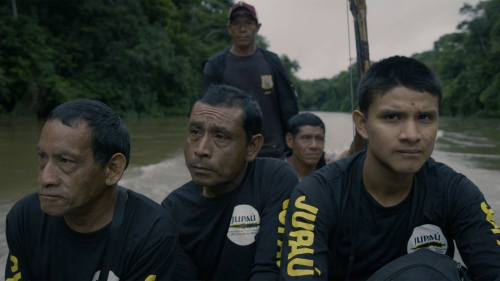
Sundance Institute
MOVIE REVIEW
The Territory (2022)
The Uru-eu-wau-wau people, indigenous to Brazil’s rainforest, have seen their land and their population decimated since the 1980s when miners made first contact in the region. Now farmers brazenly show up with chainsaws and tractors to engage in a free-for-all land grab with no governmental oversight or interference, and they are not above resorting to violence and even murder. Worse, far-right politicians such as President Jair Bolsonaro run on platforms promising a legal path to the encroachment. This fight between the Uru-eu-wau-wau and intruding farmers is the subject of “The Territory,” 2022 Sundance winner of the Audience Award for World Cinema Documentary and Special Jury Award for Documentary Craft.
This is no doubt an issue of import, and the misdeeds caught on film are deeply upsetting. But a number of things about this seem incongruous – logical fallacies, what in narrative features would be called plot holes.
One of the film’s central arguments against this agricultural avarice is that it threatens the Uru-eu-wau-wau’s way of life, yet this is a people who wear Harry Potter T-shirts, use electricity, own smartphones, communicate via walkie talkies, operate expensive film cameras and deploy drones to spy on the farmers. Neidinha Bandeira, an environmental activist advocating for their cause, at times comes off like a Karen for being an outsider lecturing them on their own traditions – granted, she’s made tremendous sacrifices and put her and her family’s lives at risk. Last but not least, it is simply hypocritical for first-world filmmaker Alex Pritz to expose Global South barbarism and incite outrage over third-world citizens’ wrongdoings, however evident those may be, after he himself has surely enjoyed the plunders of colonialism.
By coopting footage shot by the Uru-eu-wau-wau, Mr. Pritz commits a different kind of appropriation – though this is a no-win situation for him. Having the Uru-eu-wau-wau’s point of view and giving them producing credits lessen the white gaze, though Mr. Pritz’s extracting himself from the narrative feels like disingenuous evasion of accountability. Brazilian farmers make for easy targets as villains when a gringo documentarian conveniently glosses over the global economy (which he benefits from) that exploits them. Though they are apparently well-meaning, Ms. Bandeira’s and Mr. Pritz’s own white-savior complex is never explored or even recognized, and frankly it very much feels like a different manifestation of the same sense of entitlement seen in the farmers.
One comment
You have clearly missed a big point of this film….that URU-EU-WAU WAU community are actually cinematographers and were equipped to tell their own story by the “gringo-director” that you feel so entitled to critisize. The director, who you are trying to baselessly attack in your article, has found the way not to be extractive or to show not only one side of the story. This film wouldn’t be what it is if there was only Uru side of the story. The director masterfully exposed challenges and lives of both sides and I don’t feel like he showed farmers as a villains. In fact, I felt I understood the struggle of people who have no choice but to invade indigenous lands. He showed the complexity of the situation in which we are all guilty as consumers of meat and other produce coming from the Amazon. I’d recommend you watch it again.
Also, if you do any research on Neidinha, you should be ashamed to call her a Karen. She spent all her life with indigenous communities fighting for their rights, protecting them with all her might, practically a legend in the region and a mother to thee indigenous daughters. Do you still have a problem with that?